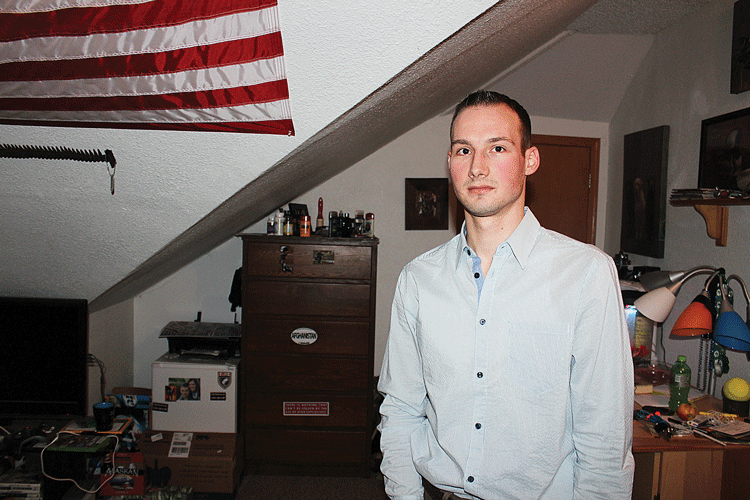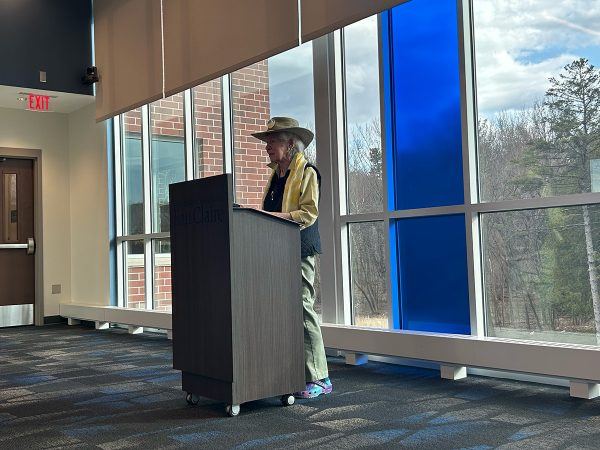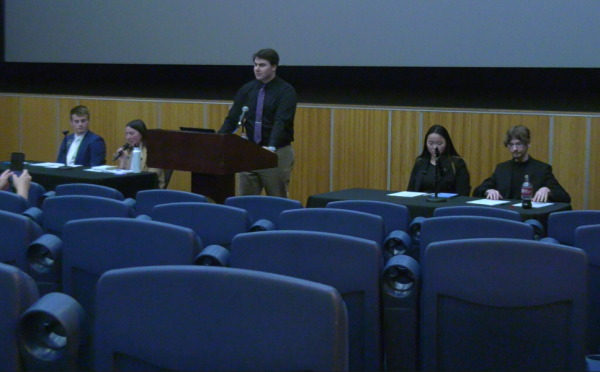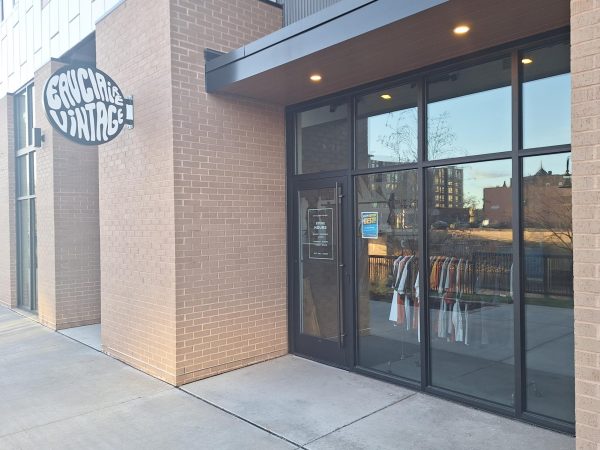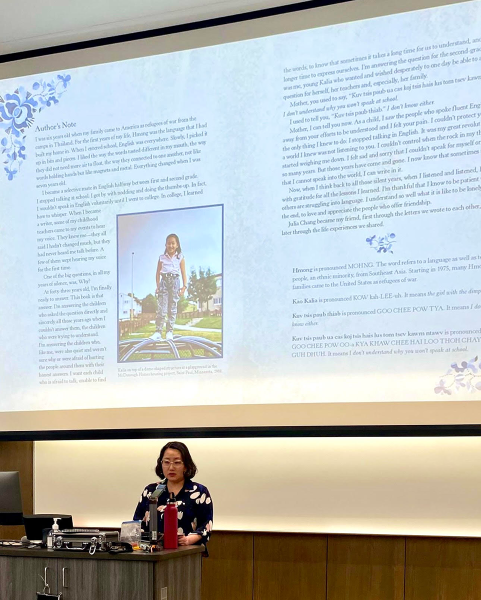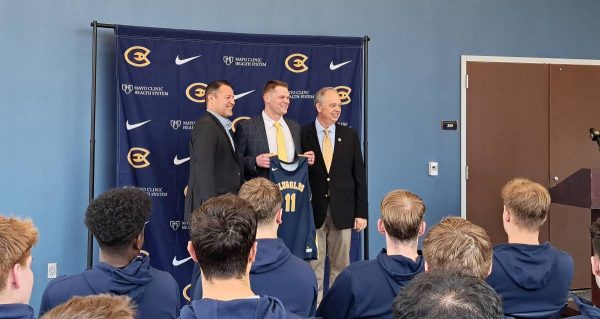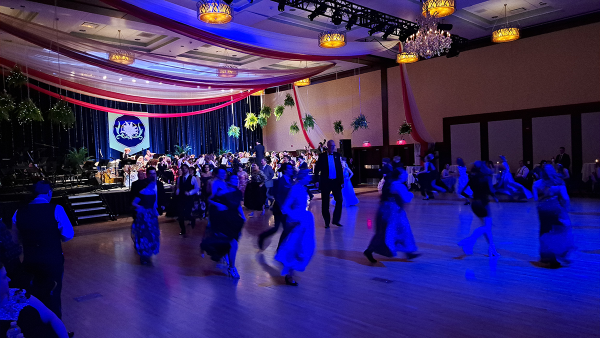From combat to campus
National Guard veteran finds renewed mission after tour; other vets relate
BACK FROM ACTION: Nick Bures was deployed to Afghanistan through the National Guard. After a nine-month tour overseas, he enrolled at UW-Eau Claire. © 2014 Nate Beck
March 6, 2014
Nick Bures remembers standing next to his dad, who was decked out in full army fatigues, in front of his third grade classmates on bring-your-parent-to-school day.
And from that point on, there wasn’t any doubt what Bures wanted to do with his life, he said.
But he’s now a senior at Eau Claire majoring in world politics — a field he said he wouldn’t have latched onto in high school.
“I want to help people,” he said. “I would never have went into this if I hadn’t seen the uglier side of human interaction.”
He enlisted in the National Guard when he was 17, midway through his junior year of high school. He then went to basic training the summer before his senior year.
He was determined to be a soldier; he was full of “piss and vinegar,” he said.
Deployment
Although Bures wasn’t required to, he volunteered to deploy to Afghanistan with his unit after high school graduation in 2008.
Improvised Explosive Devices, or IEDs, account for more than half of all soldiers killed in Afghanistan.
And it was Bures’ job to remove them.
His platoon used two different mine-sweeping trucks to unearth IEDs along travel routes. Bures rode in the gunner turret on a Buffalo, a 32-ton armor-equipped vehicle that patrolled roads at 2 mph, extracting explosives with a hydraulic arm.
Mine-sweeping missions started at dawn on dirt roads and could last anywhere between three hours and three weeks.
“It seems a little asinine what we did looking back at it,” Bures said. “But that was the job.”
And the job wasn’t quiet. His team hit IEDs or was ambushed on each mission they ran, he said.
“The crap you see on TV is not that accurate,” Bures said. “It’s not a big fiery ball and all glorified, it’s just compression and shockwaves everywhere.”
But his platoon also ran humanitarian missions, doling out donated blankets and food to local tribes. Bures said those missions are most memorable. He’s still smiling in photos with Afghan children gripping American teddy bears.
“That was probably the most satisfying part looking back at it,” he said. “Granted, at the time I was saying ‘get these smelly guys away from me, I don’t care. They’ve been blowing us up.’ I like to think I grew up from that ‘shoot ‘em all’ mentality.”
Common thread
Nick Crooks, now an information systems major, wasn’t a great high school student. Grades weren’t a top priority then, he said. He’s from Blanchardville, a town of 825 people near Madison.
Crooks and Bures are good friends. Crooks served as event coordinator while Bures was Veterans Club president at Eau Claire. They lived across the street from each other last year on Menomonie Street.
Crooks was active in Boy Scouts growing up, which fueled an interest in the military. He has an uncle was in the army and another was a major in the Air Force, so despite fears of sparking a family feud, he signed up for the Air Force during a trip to Alaska.
“I talked to the recruiter … literally within that week, flew me to Anchorage and shipped me to Wisconsin for basic training,” Crooks said.
Crooks flew triple-propeller transport planes, called C-130’s in Iraq, hauling supplies from base to base.
Senator John McCain and four state governors hitched a ride on his plane on one transport run. McCain was wearing a headset, chatting up the pilot and the crew. When the plane touched down, Crooks started unloading luggage until he felt a hand on his shoulder.
“(McCain) said, ‘it’s OK, I got this,’” Crooks said. “He’s been hung by his shoulders, had them ripped off and reattached, and he grabs his stuff and limps off the plane.”
Veterans on campus
Eau Claire is on numerous “best for vets” lists honoring veteran-friendly colleges across the nation.
And the biggest reason Eau Claire lands on these lists is Miranda Cross-Schindler, Veterans Center coordinator, Crooks said.
Cross-Schindler, an Army veteran and Eau Claire grad, took over as a full-time coordinator in 2011.
Cross-Schindler nudged Bures to run for Veterans Club president. She needed someone, and Bures said he needed to meet Eau Claire students.
Bures led the club for a year and a half and said it helped him connect with students who had followed similar paths.
“It was a nice way to branch out and talk to veterans,” Bures said. “You probably won’t see another club on campus where older people and younger people get along really well.”
Cross-Schindler said she’s working to earn that “military friendly” label, through safe space training and advising.
She said the Veterans Center helps provide services she wished she had when she was an Eau Claire student.
“I did not connect with any students during my time here,” Cross-Schindler said. “I was a commuter student; I was a parent. Having the space and having somebody to connect you has made a really big difference.”
Eau Claire retained 84 percent of student veterans in the 2011-2012 school year, which is 20 percent higher rate than Eau Claire’s total student population.
Nearly 60 percent of veterans visit the Veterans Center in the basement of Schofield Hall at least once a week, according to a survey. Most vets are between ages 25 and 35, and veteran students are 28 years old on average.
And many veterans have families to support, she said. Cross-Schindler had a child when she was an Eau Claire student. Crooks got married last August.
Because many veterans navigated tough situations in service, and because veterans are older than most students, they are more career-focused, Crooks said.
“The other students, they don’t look down at you, they don’t look sideways at you,” Bures said. “They just look at you different. Like you’re damaged goods almost.”
Coming home
Bures returned to his parent’s dairy farm in 2009. He lived across the road from his parents, in a house his grandparents owned.
He didn’t jump into school or work after service. He needed time to adjust, clear his head, he said. His officers warned him about driving cars back home. Bures swerved to avoid plastic bags and trash in the road — IED warning signs overseas — for the first month he was back.
Bures said it’s called post, not present, traumatic stress disorder for a reason. In the heat of battle there’s no time for reflection. Fuzzy focus in the field means you might get yourself or other soldiers killed.
“If you think, ‘this could be my last day on the earth,’ it kind of gets you in a depressed mood,” he said. “We joke around a lot. That was our escape. The things you had to do to survive, you have to live with when you come back.”
Bures was running a mission at night — something mine sweepers try to avoid — when his convoy was ambushed.
Unseen Afghanis fired four rocket-propelled grenades from buildings. Three hit trucks in Bures’ convoy. Sgt. Ryan Adams, a mentor to Bures and his platoon, was injured after a rocket barreled through the side of his truck.
“He died of a brain injury,” Bures said. “A bunch of guys got wounded. That’s always your worst fear when you’re over there. That somebody is going to get killed.”
Back in the states, Bures and his fellow soldiers hold a golf outing each year with Adams’ mom, dad and sister.
“I look at how hard it was on them,” Bures said. “Even though I don’t know these a******s who shot at us, they still have families somewhere. It’s hard to think you’re the cause of someone not seeing their son again.”
He said it took a tour in Afghanistan for him to realize war wasn’t the best solution, and he wants to use his major to help avoid future conflicts.
“I don’t think humans are meant to kill other humans,” Bures said. “People are violent. But killing, it’s just not natural.”

